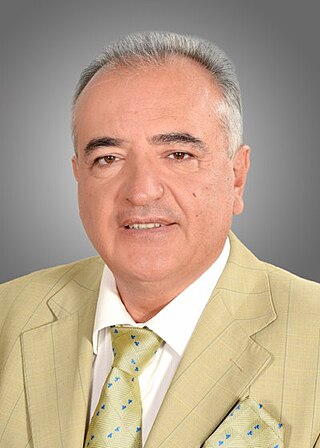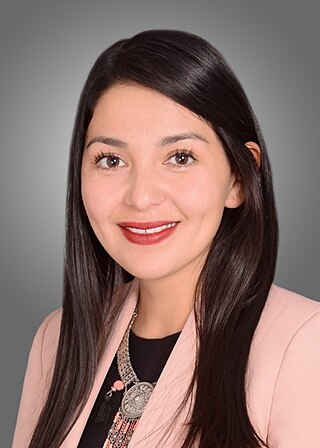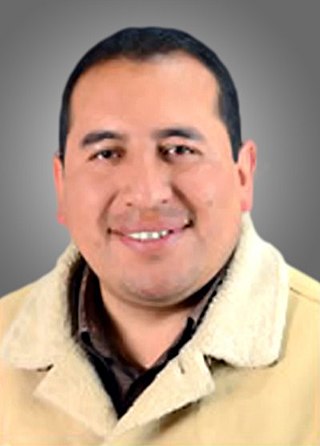
María Elva Pinckert Vaca is a Bolivian businesswoman, lawyer, and politician who served as minister of environment and water from 2019 to 2020. Pinckert developed her career in Santa Cruz's agro-industrial heartland, during which time she rose to key positions of regional economic and political influence, including presiding over the Montero Civic Committee and serving as vice president of the Santa Cruz Chamber of Industry and Commerce. Elected to the Montero Municipal Council as a member of the Revolutionary Nationalist Movement in 1999, Pinckert later switched to the New Republican Force, with which she won reelection. In 2009, the party promoted her to the Senate as a substitute senator under Germán Antelo. Amid the disunity brought about by the fragmentation of her parliamentary caucus, Pinckert aligned with the Social Democratic Movement, which nominated her for a full Senate seat. Elected in 2014, Pinckert held office until 2019, when she joined the Áñez administration as head of environmental and water policy. As with many former Áñez ministers, Pinckert faced judicial consequences for her collaboration with the transitional government, leading her to seek refuge in Brazil less than a year after leaving office.

Luis Gallego Condori is a Bolivian lawyer and politician who served as a member of the Chamber of Deputies from Potosí, representing circumscription 39 from 2010 to 2015.

Rebeca Elvira Delgado Burgoa is a Bolivian academic, lawyer, magistrate, and politician who served as president of the Chamber of Deputies from 2012 to 2013. As a member of the Movement for Socialism, she served as a party-list member of the Chamber of Deputies from Cochabamba from 2010 to 2014. Prior to her election to the lower chamber, Delgado served as a party-list member of the Constituent Assembly from Cochabamba from 2006 to 2007 and was vice minister of government coordination from 2008 to 2009. Delgado's near-decade-long political and legislative tenure was preceded by a fifteen-year career as a public servant, during which time she worked as a public defender and examining magistrate, was a magistrate on the Departmental Electoral Court of Cochabamba, and served as the Ombudsman's Office's delegate for the fight against corruption in Cochabamba.

Miriam Marcela Revollo Quiroga is a Bolivian academic, politician, and sociologist who served as a member of the Chamber of Deputies from La Paz, representing circumscription 10 from 2010 to 2015. Though Revollo's political career is closely linked to that of her husband, longtime La Paz Mayor Juan del Granado, her political origins are independent of marriage. A graduate of the higher universities of San Simón and San Andrés, Revollo entered political life as an activist in the student movement and was a steadfast advocate for the inclusion of women in the country's democratic process. Together with her husband, she founded the Fearless Movement, with which she was elected as a party-list member of the Constituent Assembly from La Paz from 2006 to 2007. As a parliamentarian, she continued to work toward the advancement of women's causes, largely supporting the social policies enacted by the ruling Movement for Socialism, even as she simultaneously criticized many of the administration's illiberal practices.

Osney Martínez Daguer is a Bolivian agronomist, politician, and rancher who served as a party-list member of the Chamber of Deputies from Beni from 2010 to 2015. Born to a wealthy family from San Borja with political links to the Revolutionary Nationalist Movement, Martínez spent most of his career in local administration, starting as a substitute member of the city's municipal council before being twice elected to a full seat on the body.

Roberto Rojas Herrera was a Bolivian accountant, politician, and trade unionist who served as a member of the Chamber of Deputies from La Paz, representing circumscription 15 from 2010 to 2015. A member of the Movement for Socialism, Rojas entered political activity as a member of El Alto's neighborhood councils, serving as secretary of sports for the city's San Pablo Zone before presiding over the District 3 council from 2000 to 2009. One rung above, he served as secretary of organization of the Federation of Neighborhood Councils from 2008 to 2010. The organization's alliance with the Movement for Socialism facilitated Rojas' entry into the Chamber of Deputies. Following his tenure in the legislature, he returned to El Alto, briefly serving as regional manager of the state-owned water and sanitation company before finally retiring from public life.

Erwin Rivero Ziegler is a Bolivian biochemist, pharmacist, and politician who served as senator for Beni from 2015 to 2020. Rivero spent most of his professional career working in the pharmaceutical industry, only entering politics at the turn of the twenty-first century. He joined the Revolutionary Nationalist Movement, holding minor posts at the provincial and departmental levels. With the collapse of the Gonzalo Sánchez de Lozada administration in October 2003, Rivero distanced himself from the government party and was appointed prefect of Beni by Carlos Mesa. He remained in office for half a year before being ousted for his role in the military's violent dispersal of protesters near Puente San Pablo. Undeterred, Rivero formed his own party, Community Autonomy, with which he competed for the Trinidad mayoralty, attaining third place, losing the contest but attaining a seat in the city's municipal council. The following year, he campaigned to return to the prefecture, finishing third. Despite his conservative political origins, Rivero aligned himself with the ruling Movement for Socialism, with which he unsuccessfully contested the Trinidad mayoralty before finally being elected as a senator for the party.

Farides Vaca Suárez is a Bolivian librarian and politician who served as a member of the Chamber of Deputies from Beni, representing circumscription 62 from 2010 to 2015.

Tito Veizaga Cossío is a Bolivian cocalero activist, politician, and trade unionist who served as a member of the Chamber of Deputies from La Paz, representing circumscription 17 from 2015 to 2020. A member of the Movement for Socialism, Veizaga followed the usual path taken by rural union leaders, scaling the ranks of trade syndicate leadership until reaching the departmental level. In 2004, he was elected to serve as mayor of Cajuata, and though he failed in his attempt at reelection in 2010, he maintained a presence in his party's internal structure. In 2014, Veizaga was elected to represent the Yungas region in the Chamber of Deputies. Though many local cocaleros opposed the government's attempt at regulating their crop, Veizaga held the party line, supporting the passage of the 2017 General Law of Coca. He was not nominated for reelection.

Felipe Molloja Báez is a Bolivian politician and trade unionist who served as a party-list member of the Chamber of Deputies from Potosí from 2010 to 2015. Raised in rural poverty, Molloja developed his career within the Omiste Province's trade union structure, holding leadership roles in various local, provincial, and regional agrarian and peasant syndicates. In 1999, he joined the ranks of the newly founded Fearless Movement, with whom he competed for the Villazón mayoralty in 2004, taking second place and attaining a seat on the municipal council. For the 2009 general elections, as part of his party's alliance with the Movement for Socialism, Molloja was elected to represent Potosí in the Chamber of Deputies. Within months of taking office, the Fearless Movement split with the ruling party, with Molloja joining his compatriots in forming a small breakaway caucus in the lower chamber.

Miguel Ángel Feeney Parada is a Bolivian businessman, lawyer, and politician who served as a party-list member of the Chamber of Deputies from Santa Cruz from 2015 to 2020. As with many members of Santa Cruz's upper-class economic elite, Feeney's career began in the department's agribusiness sector before moving on to public service. Originally a partisan of Nationalist Democratic Action, Feeney switched allegiances to the National Unity Front in the mid-2000s, serving as the party's departmental leader for Santa Cruz. In 2006 and 2009, respectively, he unsuccessfully sought to be elected to the Constituent Assembly and the Chamber of Deputies before finally attaining the post of deputy in the 2014 election.

Shirley Franco Rodríguez is a Bolivian political scientist and politician who served as a party-list member of the Chamber of Deputies from Cochabamba from 2015 to 2020. She previously served on the Cochabamba Municipal Council from 2010 to 2014.

Otilia Choque Véliz is a Bolivian community organizer and politician who served as a party-list member of the Chamber of Deputies from Oruro from 2015 to 2020.

Wilson Pedro Santamaría Choque is a Bolivian lawyer, politician, and sociologist who served as vice minister of public security from 2019 to 2020. A graduate of the Higher University of San Andrés with extensive postgraduate studies, Santamaría entered the political field as a partisan of the National Unity Front and served as the party's municipal leader for La Paz. In 2014, he was elected as a party-list member of the Chamber of Deputies, representing the La Paz Department from 2015 to 2019.

Emeliana Aiza Parada is a Bolivian politician and trade unionist who served as a party-list member of the Chamber of Deputies from Potosí from 2010 to 2015. A member of the Movement for Socialism, she represented the same department as a substitute alongside Severo Pacaja from 2006 to 2010.

Patricia Mancilla Martínez is a Bolivian politician and trade unionist who served as a party-list member of the Chamber of Deputies from La Paz from 2010 to 2015. A member of the Movement for Socialism, she previously served on the Cairoma Municipal Council from 2000 to 2005.

Ninfa Huarachi Condori is a Bolivian politician and trade unionist who served as a party-list member of the Chamber of Deputies from Tarija from 2010 to 2015.

María Alanoca Tinta is a Bolivian politician and trade unionist serving as a member of the Chamber of Deputies from La Paz, representing circumscription 10 since 2020. A member of the Movement for Socialism, she represented the same department as a substitute alongside Wilfredo Calani from 2010 to 2015.

Donato Rubén Callisaya Mayta is a Bolivian politician and trade unionist who served as a party-list member of the Chamber of Deputies from La Paz from 2010 to 2015.




















